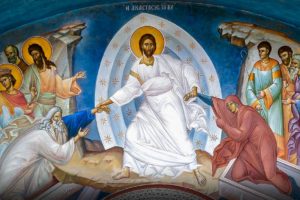
Sunrise Service at Narberth Presbyterian Church
The High Holy Day
This past Sunday was Easter Sunday, the flagship holy day of Christianity. More than Christmas, this day has been celebrated with resolute piety for thousands of years. The Christmas story, by comparison, only shows up in two of the four Gospel accounts, whereas the Easter story is in all four. Clearly, it is meant to be a special day.
However, this time around it struck me differently. There was a different tone and emphasis that profoundly impacted me in the lead up as well as the days after.
For a number of months now it has been impressed on me that Christianity, when properly understood, is a massive paradigm shift. Christianity, when properly understood, de-centers us and re-centers us around the unconditional values of what the New Testament calls the “kingdom of God.”
That being said, allow me to share with you a quote from Jesus and a poem from a saint.
The Overlooked Passage
Oddly enough, there was only one passage from the morning reading that stood out to me, and it had little to do with the resurrection of Jesus. Taken from John 20:21, which says,
“Again Jesus said, ‘Peace be with you! As the Father has sent me, I am sending you.’“
This single verse has stuck with me for 4 consecutive days now. Unable to meditate or think on any other passage, I think it may be one of the most overlooked passages in the entire New Testament. I can only guess that it is overshadowed by the following passage where Jesus breathes his Holy Breath (Spirit) on the disciples (much like God breathing life into the dirt and making mankind), and that the idea of being sent runs contrary to the predominant theme in western christianity of “escape to heaven.”
But if the Father sent Jesus to heal, to fix, to give hope… Then we have to own up to the fact that now, Jesus sends us in similar fashion. We are, in the terminology of classical orthodoxy, sent to be a new royal priesthood of prophets in the world.
The Striking Poem
Then, as I was casually looking through articles on St. Teresa of Avila (a Spanish Carmelite and Catholic reformer), I came across this poem that has since been attributed to her. It is titled “Christ has No Body.”
Christ has no body but yours,
No hands, no feet on earth but yours,
Yours are the eyes with which he looks
Compassion on this world,
Yours are the feet with which he walks to do good,
Yours are the hands, with which he blesses all the world.
Yours are the hands, yours are the feet,
Yours are the eyes, you are his body.
Christ has no body now but yours,
No hands, no feet on earth but yours,
Yours are the eyes with which he looks
compassion on this world.
Christ has no body now on earth but yours.
At first read, it is, dare I say, offensive to say that Christ has no body. Especially after the one Sunday a year where the bodily resurrection of Jesus is emphasized. But the point is this, our hands are now God’s hands in the world. If God is going to do anything in this world, it is going to be through our hands. One of the most common critiques of Christianity from atheism is that it is often “too magical,” that to “let go and let God” alleviates or excuses our calling to be like Jesus to each of our families, communities, and other spheres of influences. If the compassion of God is going to be experienced, then it must be witnessed in our actions.
As I frequently say, we experience the love of God through the concrete acts of love of one another. This is precisely why Jesus paradoxically says “to love God” and “love your neighbor as yourself” are both listed as the greatest commandment.
Granted, these thoughts are inspired by the writings of the greats of Church history, but they have somehow been left out of the picture and these themes need to be reclaimed. The best hypothesis I can come up with is from someone else. GK Chesterton was certainly onto something when he said that “The Christian ideal has not been tried and found wanting. It has been found difficult; and left untried.” I think that we want a Gospel that allows us to be passive participants rather than active engagers of the world.
The common trope is “Christianity is not a religion but a relationship.” And while I agree with the element of truth in there, I have come to resolutely see “Christianity is a revolution.”
The Final Thought
Imagine churches where, instead of coming to church and simply being passive observers, churches are places where worship is given and then people leave to be “little messiahs” to their neighborhoods? What if we took it seriously to be agents of goodness, beauty, truth and love in the world? What if our calling is not to raise hell at all times, but to lower heaven? What are Christians supposed to be if not revolutionaries for the Kingdom of God?


